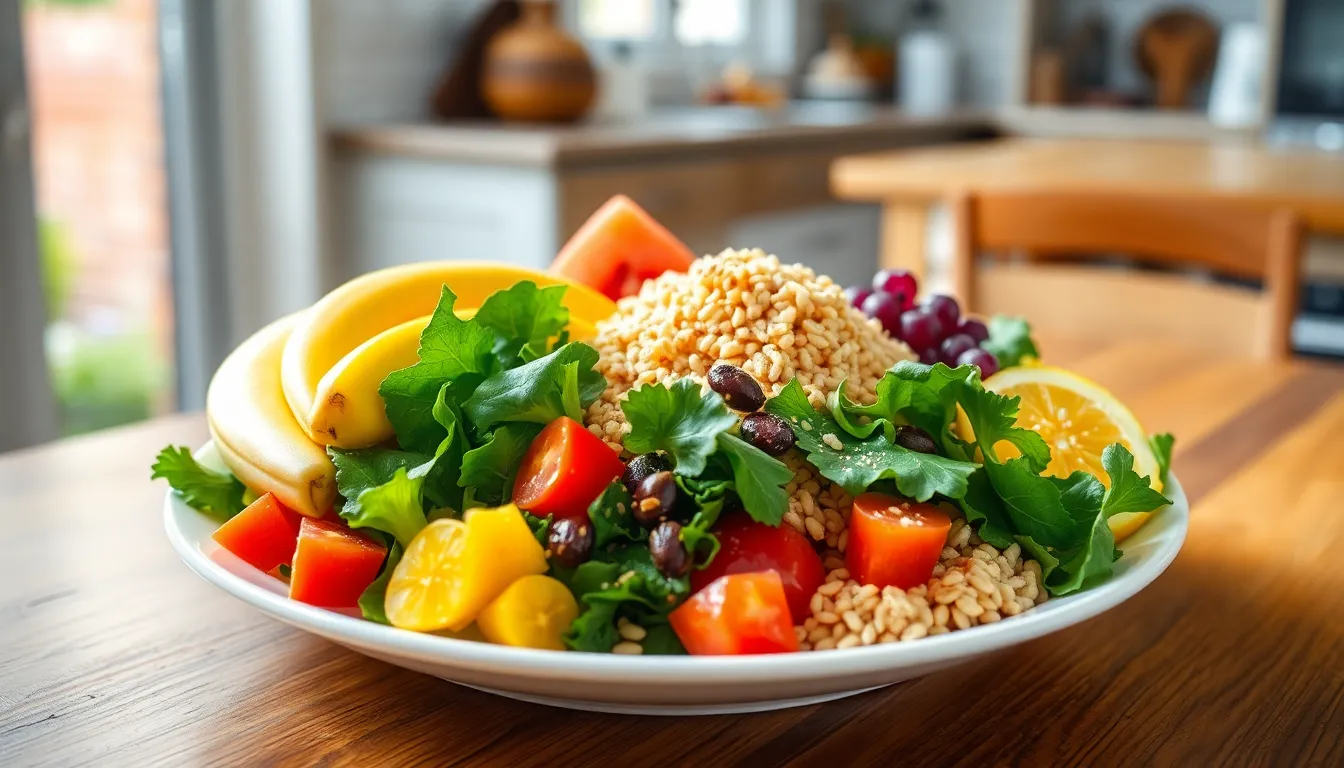Table of Contents
ToggleAcid reflux can be a frustrating condition that disrupts daily life. It occurs when stomach acid flows back into the esophagus, causing discomfort and a burning sensation. Many people seek relief through lifestyle changes and dietary adjustments, but finding what works can be a challenge.
Understanding what’s good for acid reflux is essential for managing symptoms effectively. Certain foods and habits can either alleviate or exacerbate the condition. By exploring the right choices, individuals can take control of their health and enjoy a more comfortable lifestyle. This article will delve into practical tips and beneficial foods that can help soothe acid reflux, enabling a more enjoyable eating experience.
Understanding Acid Reflux
Acid reflux occurs when stomach acid flows back into the esophagus, resulting in discomfort and a burning sensation. Recognizing this condition is essential for effective management.
What Is Acid Reflux?
Acid reflux, also known as gastroesophageal reflux disease (GERD), involves the backward flow of stomach contents into the esophagus. This occurs due to a weakened lower esophageal sphincter, which normally prevents acid from escaping. Persistent reflux can damage the esophageal lining and lead to complications if left untreated.
Common Symptoms
Common symptoms of acid reflux include:
- Heartburn: A burning sensation in the chest, often after meals.
- Regurgitation: The sensation of acid backing up into the throat or mouth, leading to sour taste.
- Dysphagia: Difficulty swallowing, sometimes accompanied by choking sensations.
- Coughing: Chronic cough or hoarseness, especially at night.
- Chest Pain: Sharp or pressure-like pain that may mimic heart issues.
Recognizing these symptoms enables individuals to seek timely intervention and lifestyle adjustments to manage acid reflux effectively.
Dietary Recommendations

Managing acid reflux requires careful attention to dietary choices. Selecting the right foods can alleviate symptoms, while others can exacerbate the condition.
Foods to Include
- Fruits: Choose non-citrus fruits like bananas, melons, and apples. They help neutralize stomach acid and provide essential nutrients.
- Vegetables: Opt for leafy greens, broccoli, and asparagus. These vegetables are low in acidity and support digestive health.
- Whole Grains: Include oatmeal, brown rice, and whole grain bread. They can absorb stomach acid and reduce reflux symptoms.
- Lean Proteins: Choose skinless poultry, fish, and tofu. These proteins promote healing without triggering acid production.
- Healthy Fats: Incorporate avocados, nuts, and olive oil. These fats aid digestion and may help reduce inflammation.
- Herbal Teas: Sip on chamomile or ginger tea. These can soothe the digestive system and potentially relieve acid reflux symptoms.
Foods to Avoid
- Citrus Fruits: Steer clear of oranges, lemons, and grapefruits. Their acidity can trigger heartburn and worsen reflux.
- Tomato Products: Avoid tomato sauce, ketchup, and salsa. These can increase acid levels in the stomach.
- Spicy Foods: Stay away from hot peppers, curry, and other spices. These can irritate the esophagus and cause discomfort.
- Fried and Fatty Foods: Cut back on fried items and high-fat meats. These foods delay stomach emptying and increase acid production.
- Chocolate: Limit chocolate consumption, as it may relax the lower esophageal sphincter and allow acid reflux.
- Caffeinated Beverages: Reduce intake of coffee, tea, and soda. Caffeine can stimulate acid production and cause heartburn.
Lifestyle Changes
Lifestyle changes can significantly impact the management of acid reflux symptoms. Adjusting daily routines and habits often leads to improved comfort and reduced frequency of episodes.
Weight Management
Weight management plays a vital role in controlling acid reflux symptoms. Excess weight increases pressure on the abdomen, contributing to the relaxation of the lower esophageal sphincter. Maintaining a healthy weight through balanced nutrition and regular physical activity can alleviate symptoms. Aim for a body mass index (BMI) within the normal range, ideally between 18.5 and 24.9. Implement gradual weight loss strategies by reducing calorie intake and incorporating exercise routines, such as walking, swimming, or cycling, to promote digestive health.
Eating Habits
Eating habits directly influence acid reflux occurrences. Adopting specific practices can help minimize discomfort. Follow these guidelines:
- Smaller Meals: Consume smaller, more frequent meals rather than large portions to reduce stomach pressure.
- Timing: Wait at least three hours after eating before lying down or going to bed to facilitate proper digestion.
- Prolonged Chewing: Chew food thoroughly to ease the digestive process and minimize the amount of acid produced.
- Hydration: Drink water adequately, but avoid excessive liquids during meals to reduce stomach expansion.
Adjusting these eating habits helps create a favorable environment for digestion, potentially reducing the likelihood of acid reflux episodes.
Natural Remedies
Natural remedies can provide relief for acid reflux symptoms, often with fewer side effects than pharmaceutical options. Several approaches, including herbal treatments and home remedies, can help manage this condition effectively.
Herbal Treatments
Herbal treatments may alleviate acid reflux symptoms through their soothing properties.
- Ginger: Ginger possesses anti-inflammatory properties that can reduce stomach irritation. Consuming ginger tea or adding fresh ginger to meals may improve digestion.
- Chamomile: Chamomile tea can promote relaxation and may reduce stress-related reflux. Drinking chamomile before bedtime may aid in sleep quality and lower acid-related discomfort.
- Licorice: Licorice may protect the stomach lining and esophagus. Using deglycyrrhizinated licorice (DGL) supplements can help soothe irritation in the digestive tract.
- Marshmallow root: Marshmallow root contains mucilage, which coats the digestive tract and may ease inflammation. It can be taken as a tea or in supplement form.
Home Remedies
Home remedies offer practical solutions for managing acid reflux.
- Apple cider vinegar: Diluting one tablespoon of apple cider vinegar in a glass of water before meals may improve digestion and combat acidic content in the stomach.
- Aloe vera juice: Aloe vera juice can soothe the esophagus and reduce inflammation. Consuming a small amount before meals may provide relief.
- Baking soda: A mixture of half a teaspoon of baking soda in a glass of water can neutralize stomach acid. This method should be used sparingly due to high sodium content.
- Bananas: Bananas are gentle on the stomach and may act as a natural antacid. Eating a ripe banana daily can support digestive health.
- Fennel: Fennel seeds can promote digestion and prevent bloating. Chewing fennel seeds or brewing fennel tea may enhance gastrointestinal function.
Incorporating these natural remedies can provide a supportive strategy alongside dietary and lifestyle changes to better manage acid reflux symptoms.
Medical Treatments
Medical therapies for acid reflux include over-the-counter medications and prescription options that alleviate symptoms effectively.
Over-the-Counter Medications
Over-the-counter (OTC) medications for acid reflux typically include antacids, H2 blockers, and proton pump inhibitors (PPIs).
- Antacids: Antacids like Tums and Maalox neutralize stomach acid quickly, providing rapid relief from heartburn and indigestion.
- H2 Blockers: H2 blockers, such as ranitidine and famotidine, reduce acid production. These medications work best when taken before meals for optimal effect.
- Proton Pump Inhibitors (PPIs): PPIs, including omeprazole and lansoprazole, inhibit acid production over a longer duration. They are effective for frequent symptoms and can provide lasting relief when taken consistently.
Prescription Options
Prescription medications offer stronger treatment options for individuals with persistent acid reflux symptoms.
- Higher-Dose PPIs: Prescription-strength PPIs can help manage severe GERD symptoms and heal esophageal damage. These include omeprazole, esomeprazole, and dexlansoprazole.
- Promotility Agents: Medications like metoclopramide promote gastric emptying, which can reduce reflux episodes by enhancing motility in the digestive tract.
- Combination Therapies: In some cases, healthcare providers may prescribe a combination of PPIs and H2 blockers to maximize symptom control and promote healing.
Utilizing these medical treatments can provide significant relief from acid reflux symptoms and improve quality of life for those affected.
Managing acid reflux involves a multifaceted approach that combines dietary choices lifestyle modifications and natural remedies. By understanding which foods to embrace and which to avoid individuals can take proactive steps toward alleviating their symptoms. Incorporating smaller meals and maintaining a healthy weight can further support digestive health.
Natural remedies offer additional options for relief with minimal side effects. For those needing more intensive management medical treatments are also available to provide significant symptom control. By integrating these strategies individuals can improve their quality of life and enjoy a more comfortable eating experience.






